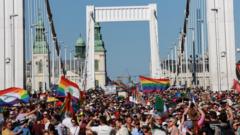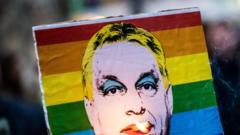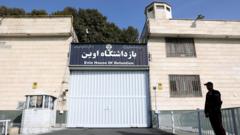**The annual Budapest Pride march saw a record attendance, fueled by opposition to governmental restrictions on LGBTQ+ rights, as thousands gathered to advocate for human rights and celebrate diversity.**
**Budapest Pride Protests Government Ban with Colorful Celebration**

**Budapest Pride Protests Government Ban with Colorful Celebration**
**Massive turnout sends a defiant message to Prime Minister Orban amidst ongoing controversy.**
This Saturday, Budapest transformed into a vivid celebration as thousands participated in Budapest Pride, expressing their defiance against Prime Minister Viktor Orban's ongoing attempts to suppress LGBTQ+ rights. With estimates ranging from 100,000 to 200,000 attendees, the Pride march spilled over iconic locations including the Elisabeth Bridge and along the Danube's banks, drawing onlookers and participants alike who danced and sang in the summer heat.
The increase in participation stands in stark contrast to last year’s turnout of only 35,000, showcasing public pushback against Orban’s controversial policies. Many participants carried banners that directly criticized the Prime Minister, aptly highlighting a growing sentiment of opposition. "In my history class, I learnt enough to recognise a dictatorship. You don't need to illustrate it - Vik!" read one banner. Another cheekily stated, "I'm so bored of Fascism," illustrating the frustration many feel towards the current political landscape.
LGBTQ+ individuals were the vibrant core of the event, but this year's celebration transcended beyond just one community, evolving into a broader human rights movement. Budapest's mayor, Gergely Karacsony, took to the stage, expressing triumph over the government’s failings. "In fact, we look like we’re peacefully and freely performing a big, fat show to a puffed-up and hateful power. The message is clear: they have no power over us!" he proclaimed, drawing cheers from the crowd.
European political figures also gathered to support the crowd. Finnish MEP Li Andersson highlighted the importance of the event as emblematic of fundamental rights for all, standing in opposition to the legislation passed by Orban's Fidesz party, which had sought to limit the portrayal and promotion of LGBTQ+ rights on the basis of children's protection.
While the police maintained a subdued presence, there was tension surrounding the new laws that would have restricted the march under a purported focus on child safety. However, Mayor Karacsony cited existing laws that allowed for the event to proceed, although police managed to record the actions of participants through newly installed cameras, channeling some civil liberties concerns.
In a contrasting atmosphere, Prime Minister Orban attended a graduation ceremony away from the festivities, focusing on maintaining public order amidst the rising tension over issues of assembly and representation. The government’s pro-media outlets criticized the event, framing it as a celebration of moral decay.
As Budapest Pride concluded, the event's impact remains to be fully determined, with legal actions anticipated concerning the restrictions on assemblies. Should the courts rule in favor of the organizers and the city, it could indicate a shift in Hungary's political narrative around LGBTQ+ rights. Meanwhile, the vibrant show of solidarity and celebration of human rights exposed the ongoing struggles and aspirations for change within Hungary's political climate.




















